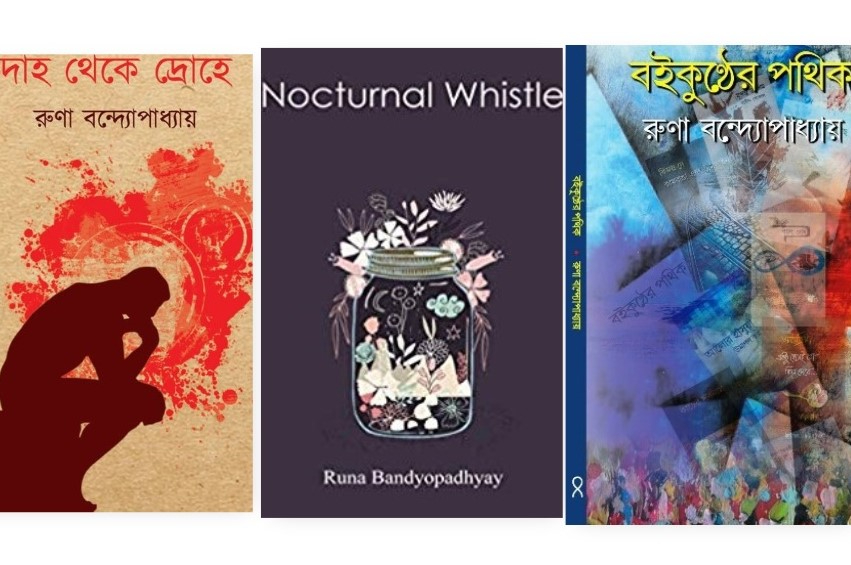A journey through the Hymns of Poetry
Read full Review at Dispatches Poetry War

Abstract:
Here is my journey through the Hymns of Poetry, a collection of Bengali poetry by Barin Ghosal, who likes to introduce himself as a villain of the poetry world. When the words of his war-weapon explode on my book-yard, I keep my mirror in parallel to the Hymns of Poetry. There may be some artifice in the level of mercury. I don’t keep the account. I always find a commanding voice in minute accounting. When the mirror becomes aquatic, it coats the whole body with transparency. If the words become definite, I start searching for the source of all the words. In the loss of war-horizon, conflict starts in all the compounded words. Thirst has been kept in speechless Ashvini’s[1] gospel. Love of water. Ammunition becomes Albatross. The expansion of deer is in the vacillation of unknown eyes. It’s unseen, un-embodied. If you keep the subject in interior, you can think of an expansion. The mirror wants to show as much as possible without mercury. Some hymns piled up in the exterior of object, in the interior of its reflection. Sitting between the lines, I start conversation with them.
[1]Ashvini –The Horse shaped wife of the Sun God, according to Hindu mythology. It’s also the name of the first of the 27 stars according to Hindu astronomy.
A journey through the Hymns of Poetry
Once the flesh and bone of the poetry-animal becomes river, the mantra-words float over the water. In the deduction of glory from mantra, the silent bridge of counsel sits on the words. I spread a marine map between the longing and receiving. Longitude and latitude looks at their faces by reversing themselves. The poet opens the skin of the words and puts them to sunshine. Limitless light when the colour-illusive windows become naked. In the rippling of light I become colour blind in my own ways. When the lightning from your pheromone flashes, I start walking to pick up the secret sunshine from your book-yard. Water-sign of Sulota[1]and Manorama[2]dazzles. I don’t understand what the torn sound of tear-glands of the riverside people is talking about. Keeping down the burden of understanding, I sit down in the courtyard of words. The music of the Junggaan[3] played around. The confused feather flies away through the path of silent tune. My eyes become naked by shedding eyelashes to see the secret flash. Keeping the face on the back of the open thought, I search for shadow of the face. Search is a surprising marine path. The spattered water path on the back of the navigator separates water from the path. The path doesn’t write any deer’s footsteps. Yet the crystal-clear reflection in water is gathering the applied lightning in the brain. When the unpaired charged particles spin around themselves, that man pronounces,
When the electricity tried to rise, it fell on the feet
Opened petticoat is giving its consent
Thought didn’t reach to the brain
This static charge, static human hair
Nothing lost in this sky, breathing space
All the clouds remained in the eyes
[“Software of Love Tune”, P-14]
Who’s that man? Yes, he’s that villain of the Bengali poetry world who utters the mantra of liberation of poetry. Everyone knows about his identity. Let it go at that. Rather, we could revisit to that person’s eight round programs of poetry writing,
- I’ve come out of the analogy, not using the ‘like’ word.
- If any image appears, I tear it; knowingly I don’t want any image.
- I exclude the most used words. Again knowingly.
- New subject to catch.
- We have to forget all pronouns like we, ours, you, yours.
- Deduct the symbol if you recognize it, cross it to make blank. Rather beprotik[4].
- No drama.
- Omit all the context of places you lived or visited.
[“Khalasitola” P-154][5]
Everything has been omitted. Then what remains? Is it possible to make the poetry with the few remaining? Yes, that person could do it. And sitting on the shore of his ability we listen to the Hymns of poetry,
I read the Hymns of poetry again and again in every dawn
From the moonlit web I bring down the aqueduct of electricity
Every Sulota of triangle floats inside the softness of torn cover
Sitting silently to listen to the words of Soft tiger
words of local God
the fun of calling sunflower as child-face
[“Hymns of Poetry-1”, P-11]
The ninth moon is on the back of the poetry. By opening the interior of its canopy, I’m sitting in the side from which the wind flows. The deposited sorrow of breathing at the feet of well-shaped windmill is moving far away. All our artistry is during the exchange of dive and diver on the sun-shined pages. Sign of churning weep. All the receding is by measuring your distance from the sign. Actually, distance is a border-crossing horizon. There’s no nameplate, no advertisement, no platform. Yet there’s a silent focal point; where the boy dot com walks down. As a result, those receding touch the Infinity. The hint overflows by keeping the fingers on the navel-root of touching sign.
[1]Sulota – Name of an Indian lady, a favourite character used by Barin Ghosal in his poetry.
[2]Manorama – Name of an Indian lady, a favourite character used by Barin Ghosal in his poetry.
[3]Junggaan– Song of Jungle, Jung(word made from Jungle), gaan (song).
[4]Beprotik – Opposite to symbol, Be (denoting opposition) Protik (symbol).
[5]Khalasitola – Memories of Khalasitola in Kolkata, edited by BarinGhosal and published by Kaurab in 2011. It was the name of a bar in Kolkata, which became the centre of literary discussion of famous litterateur of 1960 to 1980.
Note: All the used poems of the Hymns of Poetry has been translated by reviewer.
